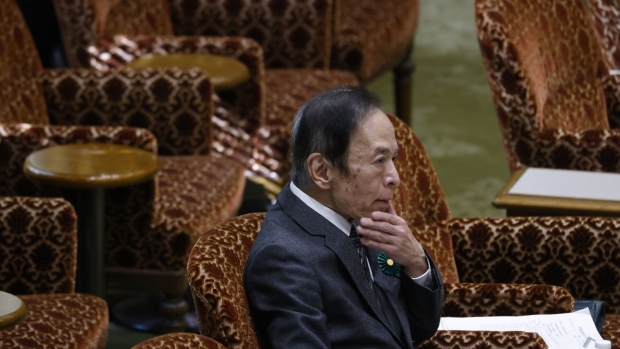Apr 10, 2023
Ueda’s Dovish Stance Looks Unsustainable as Price Pressures Bite
, Bloomberg News

(Bloomberg) -- A dovish stance from new Bank of Japan Governor Kazuo Ueda at his inaugural press conference is likely to be short lived, according to strategists.
A steady-as-she-goes series of comments on measures from yield-curve control to negative interest rates sent the yen sliding as Ueda hinted any significant policy tweak may be unlikely for the time being. But market participants still see a policy shift as inevitable in the face of rising inflation and will closely watch the language at this month’s policy meeting before making any changes to positions.
BOJ’s Ueda Says Appropriate to Keep Policies Unchanged for Now
Here’s a selection of comments from Japan watchers:
Attention on Next Meeting
Teppei Ino, head of global markets research at MUFG Bank Ltd.
“Ueda’s first press conference spurred a weaker yen probably because some market players who expected him to provide more details about yield-curve control tweak were disappointed. Basically, Ueda indicated maintenance of the current monetary policy framework, including the negative interest rate. However, this will unlikely be a factor to successively sell the yen and investors will probably await discussions at the April 27-28 policy meeting.”
Chance of April Tweak Remains
Hideyuki Ishiguro, senior strategist at Nomura Asset Management Co.
“Despite Ueda’s remarks, there remains possibility to tweak the yield-curve control at the BOJ’s April meeting. Any hint of the adjustment in advance would just encourage speculative bets against the policy. So, he might have been cautious not to provide any hint, which in turn shows possibility to see a tweak in April. The yen weakened as Ueda said it’s appropriate to maintain the yield-curve control and negative interest rate policy, making export-related stocks such as electric and precision appliances stocks attractive to buy.”
Gradual Path
Tsutomu Soma, a bond and currency trader at Monex Inc.
“Looking at Ueda’s press conference, the BOJ will probably continue the current policy and only gradually adjust the policy by closely watching data over a period. They may take at least 6 months to watch the data before a tweak. If they abolish the yield-curve control now, the yen will sharply strengthen, which may not be desirable. The Fed may raise its key rate in May but that may be the last, which still keeps the two nations’ yield gap to a certain extent and keeping the dollar-yen pair in a certain range. However, the basic trend may be for a stronger yen because Japan’s direction is toward tightening through adjustment or removal of YCC.”
Policy Tightening Still Likely
Joseph Capurso and Kristina Clifton, strategists at Commonwealth Bank of Australia.
“Policy tightening is still more likely than not given the trends in inflation and wages. Dollar-yen will remain guided by US Treasury yields. Risks are skewed down amid risk of Bank of Japan tightening. Nevertheless, USD/JPY can lift to 134.68 if financial markets revise up their expectations for the FOMC Fed funds rate this week.”
Forward Guidance Governor
Shoki Omori, chief desk strategist at Mizuho Securities Co.
“I don’t think the new BOJ is thinking about major policy change in April and June monetary policy meeting given their cautiousness in data and overseas banking sectors. There are two quick takeaways. First, it was hard to him to scrap the comment that he made at the parliament. I believe he likely identifies himself as a ‘time-axis policy (forward guidance)’ governor. I do think he is against negative interest rate policy as he said it is harmful in terms of financial intermediary function but he possibly could not directly deny it.
Secondly, Ueda’s presser started quite late at 7:15pm, in which Japanese markets were closed. If he were to make a drastic change in tone of his language, it would give foreign investors advantage over domestic investors in major products. I do feel Governor Ueda would want to be data oriented and maintain status quo. For trades, I’d like to retain 20s30s flatteners, 5y JGBASW, and short USD/JPY with short RR.”
Slightly Dovish
Masamichi Adachi, chief Japan economist at UBS Securities and a former BOJ official
“I think it was slightly dovish. Overall, the emphasis was on the continuation of monetary easing rather than the side-effects of YCC. So I think it would be really surprising if, after this, there’s a policy change on April 28.”
“Until the news conference, I too expected YCC to be abandoned around June-July, but after yesterday’s comments I think that any policy changes will rather be tweaks and YCC may continue to be maintained.”
Policy Review
Shinichiro Kobayashi, principal economist at Mitsubishi UFJ Research and Consulting
“Instability in the US financial system in March helped ease upward pressure on Japanese long-term interest rates... This means he now has more time to consider whether or not the current YCC can be maintained. As he now has more time, there’s no need to rush and revise monetary policy, and I think he’d want to maintain easy conditions as much as possible.”
“However, now that there’s much market speculation that YCC will be revised in the near future or eliminated, it is possible that Ueda at his first meeting lays the groundwork for changes in some form, such as proposing a review while still maintaining policy.”
--With assistance from Masahiro Hidaka, Yoshiaki Nohara and Erica Yokoyama.
(Adds additional comments.)
©2023 Bloomberg L.P.





